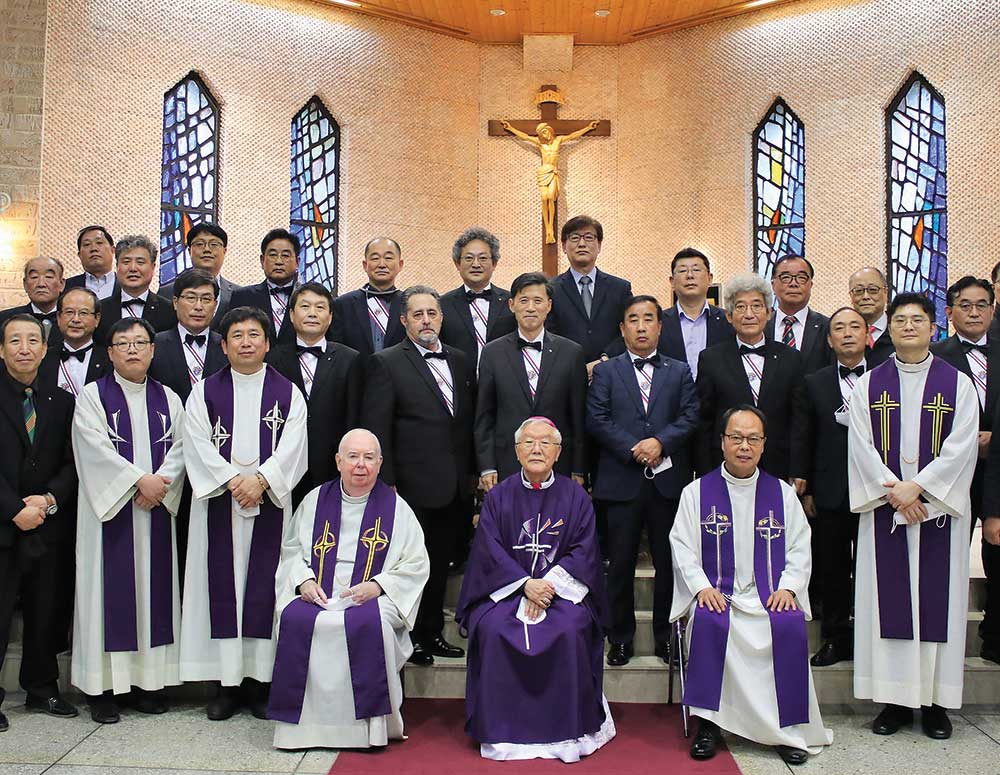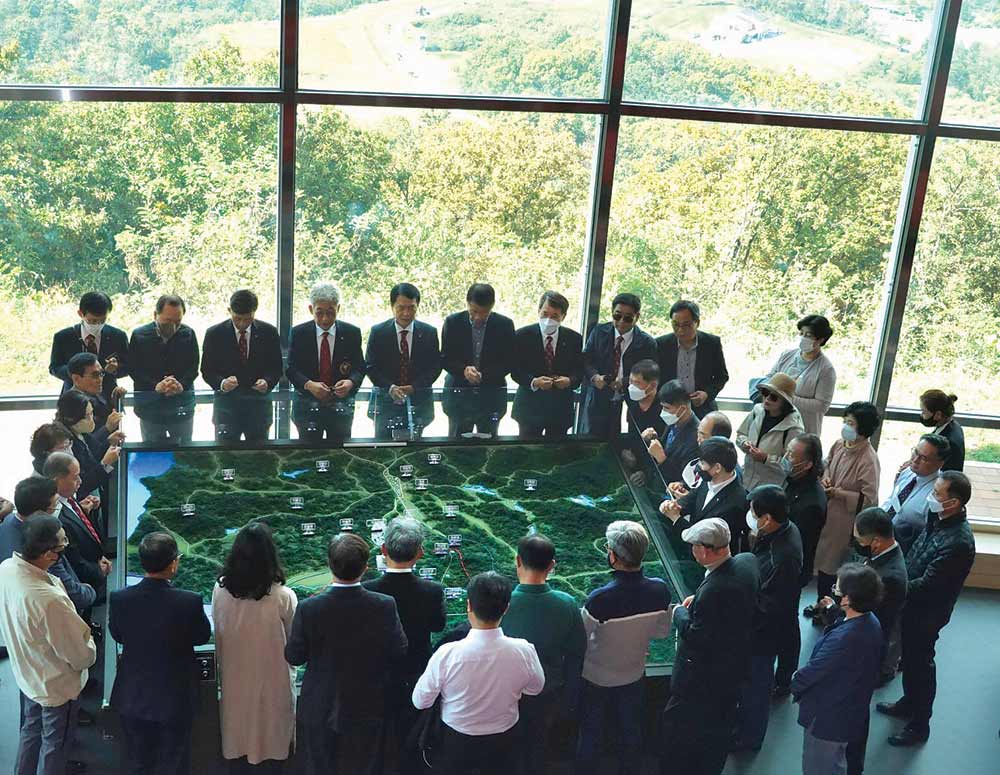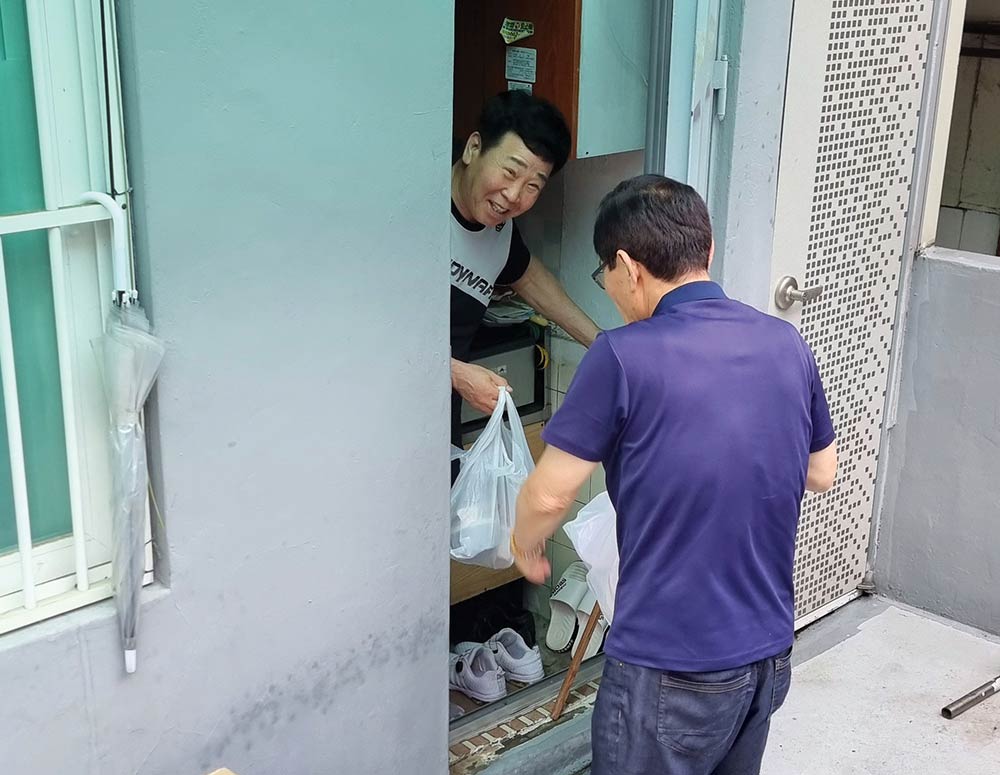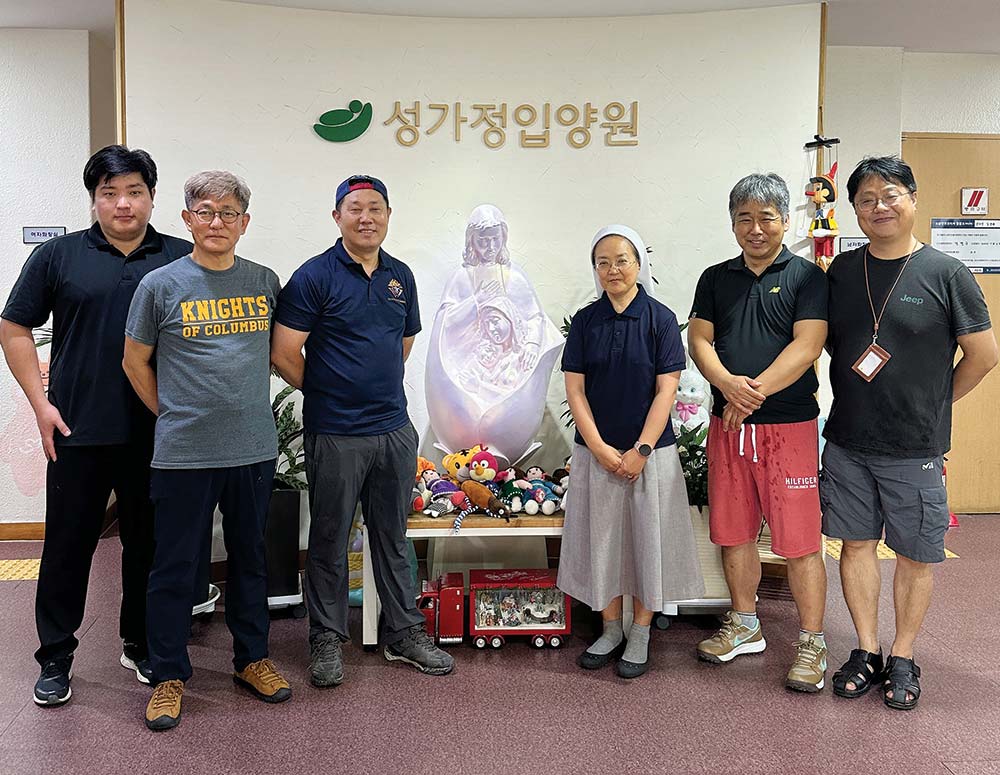Service and Witness in South Korea
The Order celebrates 10 years of local presence in the Republic of Korea, building a culture rooted in faith, charity and respect for life
By Alex Jensen
9/1/2024
 Knights of Columbus leaders in South Korea, including Territorial Deputy Shin Kyoung-soo (second row, center), gather in the chapel of the Military Ordinariate of Korea after a Mass and ceremony to honor retiring Bishop Francis Xavier Yu Soo-il (seated, center) and welcome then-Bishop-elect Titus Seo Sang-bum (seated, right) in 2021
Knights of Columbus leaders in South Korea, including Territorial Deputy Shin Kyoung-soo (second row, center), gather in the chapel of the Military Ordinariate of Korea after a Mass and ceremony to honor retiring Bishop Francis Xavier Yu Soo-il (seated, center) and welcome then-Bishop-elect Titus Seo Sang-bum (seated, right) in 2021
Traditionally known as “the land of morning calm,” South Korea is a country of stunning contrasts. Serene mountains and forests stand alongside bustling urban landscapes filled with skyscrapers and digital billboards.
The music and drama of this vibrant country have exploded onto the global stage in recent years. But South Korea — officially known as the Republic of Korea since 1948 — has also attracted global attention for a starker reason. With the average number of expected births per woman falling to a record low of 0.72 in 2023, South Korea has the lowest birth rate in the world; to stabilize the local population, the birth rate needs to increase to 2.1.
The demographic trend has also affected the Catholic Church in Korea. After growth of close to 1,200% over the last 50 years, Korean Catholics make up around 11% of the overall population. But their growth has flattened to 0.1-0.3% since COVID-19 hit in 2020, according to a report by the Korean Bishops’ Conference last May. Meanwhile, the majority of people in South Korea have no religious affiliation at all, based on a 2023 Korea Research survey.
Against this backdrop, Knights of Columbus in Korea have been working to support the local Church’s efforts of charity and evangelization while driving home a pro-life message. A decade has passed since the first non-military Korean council was established: St. Andrew Kim Tae-gŏn Council 16000 in Seoul, named after the first Korean priest, who was executed for his faith in 1846. His legacy, along with that of the many other Korean martyrs whose feast day falls on Sept. 20, continues to inspire zeal and perseverance among the country’s Knights — now consisting of several hundred members in eight local councils, including two established in recent months.
Territorial Deputy Shin Kyoung-soo, a retired major general of the Republic of Korea Army, affirmed, “My greatest goal is to make the Korean Knights of Columbus the strongest support of the Korean Catholic Church. And we will do our best until a culture of life is firmly rooted in this land.”
ORIGINS AND GROWTH
The seeds of the Order’s expansion to South Korea were planted when Bishop John J. Kaising Council 14223, the first military council on the Korean Peninsula, was formed at Camp Humphreys, a U.S. Army garrison 40 miles south of Seoul, in 2007.
Two military priests — retired U.S. Army Chaplain F. Richard Spencer, now a bishop of the Archdiocese for the Military Services, USA, and Bishop Emeritus Francis Xavier Yu Soo-il, OFM, of the Military Ordinariate of Korea — proved to be instrumental in growing the Knights in Korea after they joined Council 14233. Following Bishop Yu’s return from the 131st Supreme Convention in San Antonio in 2013, he enthusiastically paved the way for the country’s first “civilian” councils, which Supreme Knight Carl Anderson announced the following year.
“I am sure that South Korea, like the Philippines, will play a significant role in the future of the Knights of Columbus,” Anderson said in his annual report in 2014.
District Deputy Paul Moon Chan-woong’s experience is a good example of how interest in the Order spread. Moon learned about the Knights in 2012 from Joseph Pak, who worked for the U.S. Department of Defense and served as a deacon for the U.S. military archdiocese.
 Knights and their families pray a rosary for peace at the Dora Observatory, near the border between South Korea and North Korea, in 2022. The Knights also attended Mass, celebrated by Bishop Titus Seo Sang-bum, at the only Catholic church in the Joint Security Area. Several Knights were instrumental in designing and constructing the church, which opened in 2019.
Knights and their families pray a rosary for peace at the Dora Observatory, near the border between South Korea and North Korea, in 2022. The Knights also attended Mass, celebrated by Bishop Titus Seo Sang-bum, at the only Catholic church in the Joint Security Area. Several Knights were instrumental in designing and constructing the church, which opened in 2019.
“As I explored the history of the Knights of Columbus, I became convinced that this was exactly what South Korea needed,” recalled Moon, who became a member of Council 14223. “I was particularly moved by the dedicated life of Father McGivney, especially his devotion to helping parishioners facing social, religious and economic difficulties in the early days of the Knights.”
When St. Andrew Kim Tae-gŏn Council 16000 was chartered two years later, he became the council’s financial secretary. Reminiscent of the first Catholics in Korea who brought Christian texts from abroad, Moon initially faced the arduous task of translating various Knights of Columbus documents into Korean — an ongoing responsibility for South Korean Knights. Moon’s most important mission, however, was becoming a “fisher of men.”
One of them was Matthew Hong Sung-tae, who joined the Knights in 2015.
“I was looking for a new church group to join after moving to a different city for work,” recalled Hong. “I was recommended to join the K of C by a senior member, Paul Moon Chan-woong, who already knew my thoughts and experience regarding the pro-life movement.”
In 2016, Hong transferred to South Korea’s second civilian council, St. Paul Chŏng Ha-sang Council 16178 in Seoul. Hong’s connection to his council’s namesake, who like St. Andrew Kim Tae-gŏn is a Korean martyr, is closer than most: He is related to St. Paul Chŏng Ha-sang on his mother’s side.
As Korea’s first Knights of Columbus stood alongside fellow Christians at events such as the annual March for Life in Seoul, the Order was not well-known, even in the Catholic community. For instance, Sister Alphoncia Yoon Mi-suk, the director of the Holy Family Adoption Center in Seoul, was initially confused about who the Knights were.
“The word for ‘knight’ in Korean also means ‘driver,’ so she thought we were a group of Catholic car drivers!” Hong explained. “However, when she saw us passionately speaking and marching, she was convinced that we should work alongside the Holy Family Adoption Center forever.”
The center has become a focal point of volunteer efforts for local Knights, who assist with cleaning projects, make repairs and organize holiday gifts.
 A man receives a meal from Choi Kumwook, a member of St. Peter Yi Ho-yong Council 17799 in Bucheon, South Korea. Every Thursday, council members deliver meals to community members in need.
A man receives a meal from Choi Kumwook, a member of St. Peter Yi Ho-yong Council 17799 in Bucheon, South Korea. Every Thursday, council members deliver meals to community members in need.
The Order in South Korea has also built a tradition of supporting vulnerable migrant workers and refugees. One noteworthy example came in 2016, when 500 Yemeni refugees arrived on Jeju Island, 50 miles south of the Korean mainland. Amid a fierce public debate, the Knights took action without hesitation.
“Brother Lee Dae-woon of Council 16000 began to take care of five refugee mothers and their children in his own home,” Moon recounted. “His house soon became a Peace Refugee Center where refugees found new hope. We not only provided them with daily necessities and medicines, but also helped provide legal counseling, employment support and psychological therapy.”
Those efforts continue today, having only been enhanced since 2018, when South Korea was designated as a Knights of Columbus territory.
“There have been many challenges along the way, but we have overcome them together,” Moon said. “Being promoted to territory status was a moment of great pride for us.”
AT THE CROSSROADS OF LIFE AND DEATH
When Pope Francis visited South Korea in 2014, just over a year into his papacy, his every word and move drew attention. A significant focus of his trip was the beatification of 124 additional Korean martyrs, among thousands of unnamed men, women and children who died for their faith during the Joseon dynasty’s persecution of Christians in the 1800s. However, a moment of silence by the pope also inspired headlines as he stopped to pray at a monument for aborted children during his trip.
Abortion has been a particularly contentious subject in South Korea since 2019, when the country’s ban on abortion was ruled unconstitutional. No laws regarding abortion have been passed since then, however, causing confusion among medical practitioners about when abortions may be legally conducted and leaving activists on both sides of the debate room to protest.
“The Korean Catholic Church, which took root here 240 years ago, is facing a crisis amid growing pains and the materialism of modern Korean society,” explained Bishop Titus Seo Sang-bum of the Military Ordinariate of Korea, a retired Korean Army chaplain who serves as territorial chaplain. “The dignity of humanity and the dignity of life are being undermined day by day. There is a noticeable tendency to abandon sacred marriage or avoid having children.”
With this in mind, Maj. Gen. Shin made the pro-life movement a key area of focus when, following 37 years of active military service, he was appointed South Korea’s first territorial deputy in 2020.
“I wanted to engage in volunteer work after my military discharge,” Shin said. “The Knights provided that opportunity, and we made the protection of the unborn our top priority. We have been providing ultrasound machines to health centers, teaching people about the sanctity of unborn life and supporting consultations with mothers.”
Matthew Hong Sung-tae has served as pro-life committee chairman for the territory since it was established in 2018.
 Knights in Seoul stand with Sister Alphoncia Yoon Mi-suk, director of the Holy Family Adoption Center, in August 2023. Members regularly volunteer at the center and last year refurbished its statue of the Holy Family.
Knights in Seoul stand with Sister Alphoncia Yoon Mi-suk, director of the Holy Family Adoption Center, in August 2023. Members regularly volunteer at the center and last year refurbished its statue of the Holy Family.
“Currently, South Korea is at a crossroads as to whether it will become a country that spreads a culture of death around the world or a country that spreads a culture of life,” Hong said. “It is at this point that the Korean Knights of Columbus stands as a voice for life.”
Another key goal under Shin’s leadership is inspiring young people. As stated by Bishop Seo, “The Catholic Church in Korea has entered an aging phase. In order to inherit and practice the great spirit of Father McGivney, we need to focus on younger people.”
Providence has been kind to the Order in this regard, as Seoul will host the next World Youth Day in 2027. The South Korean Church expects that up to 1 million pilgrims and volunteers will attend the event, including many Knights.
By then, the Knights of Columbus in Korea is bound to have grown further in strength and numbers. With the seventh and eighth local councils established this summer, membership has risen tenfold since 2014. Before long, Korean Knights hope to establish councils in all 16 South Korean dioceses in order to build a nationwide network and spread the spirit of service and fraternity among the faithful.
“The Order is definitely expanding,” Shin affirmed. “I hope that the Korean Catholic Church will also grow further, and that within the Church the Knights of Columbus will play a role in building a culture of serving those who are suffering, sick and in need. There are so many places that could really use our help in spreading the faith and the light of the Lord.”
*****
ALEX JENSEN is a broadcast journalist and writer based in Seoul. A married father of four, he converted to Catholicism after moving to South Korea from Great Britain in 2010.